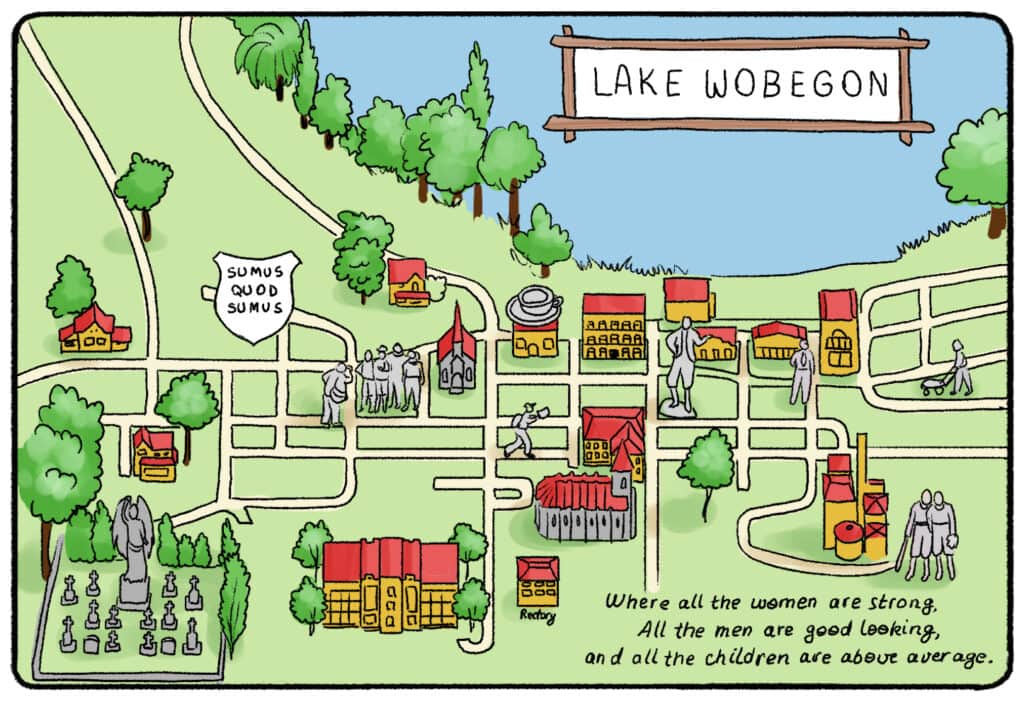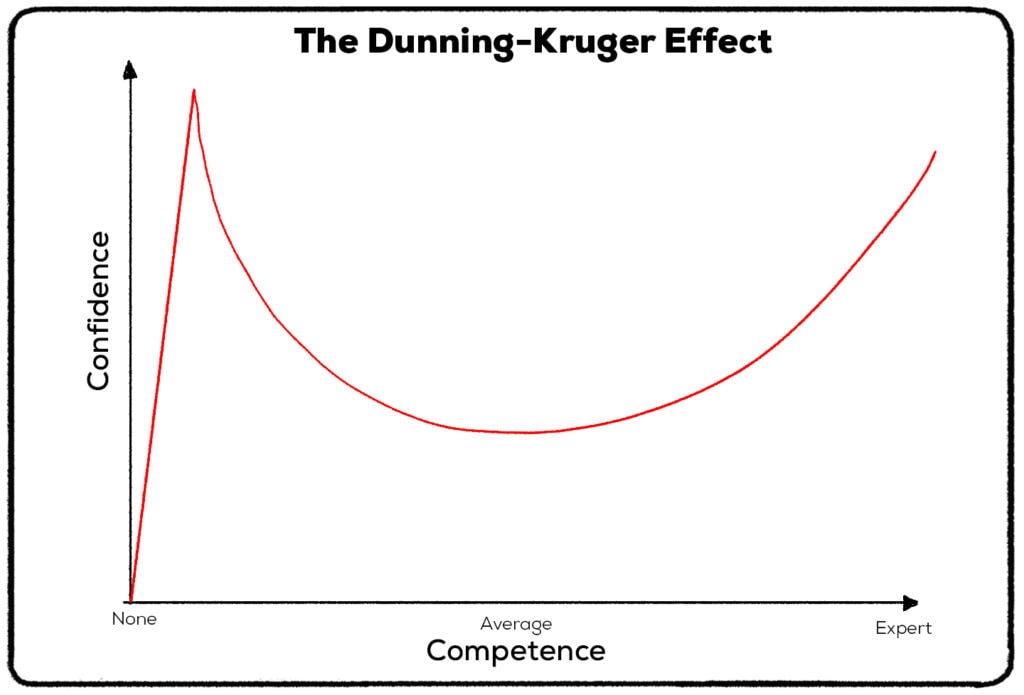The Lake Wobegon Effect is one of those phenomena in psychology that you can immediately apply to many people in your life. But what is it? Let's find out!
What is the Lake Wobegon Effect?
The Lake Wobegon Effect, often called the Lake Wobegon Fallacy, is the tendency to overestimate one’s abilities. This is more likely to show up when we compare ourselves to others, which social psychologists say is a natural way to gauge our process and skills.

What Is Another Name for the Lake Wobegon Effect?
You may also know the Lake Wobegon Effect by one of its other names:
- Illusory Superiority
- Superiority Bias
- Above-Average Effect
Is Lake Wobegon A Real Place? History of the Lake Wobegon Effect
In 1987, a physicist named John Jacob Cannell published a report that was equal parts comical and concerning. The report looked at how each state in the country fared when it came to elementary school performance. The actual rankings of the states don’t matter for the purpose of this page. What does matter? Each state reported that the performance of their elementary schools was above-average.
Every single one believed this to be true.
Obviously, that is impossible.
Sure, some of the states were above average. But for every state that is above average, there is going to be a state that is below average. That’s kinda the point of finding an average number.
At the same time, a radio show called Prairie Home Companion was broadcast live every week. The setting of the show was a fictional city called Lake Wobegon. Garrison Keiller, the host of the show, would say that Lake Wobegon was a place where “all women are strong, all men are good-looking and all children are above-average.”
Thus, the Lake Wobegon Effect was born.
What Abilities or Skills Are Overinflated By the Lake Wobegon Effect?
It turns out, we think we’re above-average at a lot of things. Studies on the Lake Wobegon Effect have focused on skills like leadership, popularity, and investing ability. A majority of participants believed that they were above average at these skills. The Lake Wobegon Effect even appears when people are assessing their luck or beating the odds when facing a terminal illness.
The one skill that comes up again and again when we talk about the Lake Wobegon Effect is driving. In 1981, psychologists asked participants how they would rank themselves when it came to their driving ability. 80% of the participants put themselves in the top 30% of drivers. And while this obviously does not reflect reality, it may have some very real consequences.
This effect is even more concerning now than when it was first studied in the 1980s. Distracted driving killed 2,800 people in 2018 alone. That’s over seven people per day. Most distracted driving accidents are caused by texting, calling, and other cell phone usage. And while a majority of people believe that distracted driving is dangerous, a majority of people also use their cell phones while driving. Psychologists see a link between the Lake Wobegon Effect and these numbers. A driver may say that texting and driving are dangerous for other people to do, but make an exception for themselves, a supposedly above-average driver.
Similar theories in social psychology emphasize how much time we spend looking to others to assess ourselves. Social psychology also attempts to explain why we don't always have
Lake Wobegon Effect and Social Comparison Theory
Leon Festinger laid the groundwork for the Lake Wobegon Effect by introducing the Social Comparison Theory. Social comparison theory was first introduced to the world in 1954. Of course, people have been comparing themselves to others since the dawn of time. The theory just attempted to explain why.
Festinger proposed that we compare ourselves to people as a way to judge our own performance. Let's say you go to a rock climbing gym for the first time. The bouldering routes are ranked in difficulty from v0 to v8. After taking a lesson and exploring some different routes, all you can complete are v0 routes. What does this mean?
Most likely, you try to answer that question by looking around you. No one is completing any v8s. Only one or two guys are even making it to the top of the v6 routes! For the most part, everyone is sticking to the v0 through v2 routes. This is a good sign! You're certainly a beginner, but you know that it's a long journey for everyone. You feel more confident.
Types of Social Comparison
We don't just compare ourselves to others when learning new skills. Festinger suggested that social comparison was an innate drive that continuously affects our thinking and judgment. There are also different forms of social comparison that we may use to assess where we are at:
- Upward social comparison is the process of comparing ourselves to people "above" us. This is productive when we look for ways to improve our standing or our skills. Working with a mentor, for example, is a great example of upward social comparison.
- Downward social comparison is the process of comparing ourselves to people "below" us. This is productive when it puts our problems into perspective. Maybe you have a Bachelor's degree and you look at all the people from your hometown who are still unsure of their career paths. For a moment, you may feel relieved and proud of the work you have done.
Of course, both forms of social comparison can also be unproductive. Unfortunately, we are inundated with so much content from other people online that we are constantly comparing ourselves to others. Be aware of this as you scroll through social media or compare yourself to the lives of other people online. We have an innate drive to make this comparison, but we can correct it in our minds and be appreciative of who we are and what we can do.
Lake Wobegon Effect and Dunning-Kruger Effect

The Lake Wobegon Effect is not the only concept that suggests we are hyping ourselves up too much. The Dunning-Kruger Effect explains a similar tendency, although there are slight differences between the two ideas.
The Dunning-Kruger Effect essentially says “you don’t know what you don’t know.” If you don’t know a lot about a subject, you are not likely to know how far behind you are compared to others. This can create a real sense of overinflated, and cringe-worthy, confidence.
Let’s say, for example, that a guy wants to take up coding. Having no coding experience or knowledge, he may think, “How hard can it be?” He has experience with HTML, so he’s already on his way to being a great programmer, right?
Anyone with a little more experience in coding may be shaking their heads. The guy’s lack of experience has shielded him from all of the other coding languages out there: CSS, JavaScript, Python, C++, SQL, you name it. Only until the aspiring programmer gets into coding will he realize that his abilities aren’t so ahead of the game.
The Dunning-Kruger Effect is especially concerning. It suggests that people with the least amount of knowledge on a subject are still (if not more) likely to rank themselves much higher than they actually are.
Other Social Psychology Theories
The identification of other cognitive biases and phenomena in social psychology helps us understand why we make the decisions we do. Psychologists have made a lot of progress in the world of social psychology!
Social Facilitation Theory
Social facilitation theory suggests that people perform better when they're in the presence of others. The experiments that led to the development of this theory are some of the earliest in social psychology. They date back to the 1800s! Researchers in the experiment asked children to wind up some fishing line. They compared the performance of the children when they were alone versus when they were in the presence of others. Children wound up the fishing line much faster when other people were watching!
Attribution Theory
When we look at people, we see how they perform. We also see the decisions people make. If you see someone steal a bike or help an old lady across the street, what do you think about that person? Attribution theory attempts to answer this question. It explores how we attribute certain behaviors to a person's character or environment.
If you've ever made a false assumption about someone, you know that we aren't always perfect in how we attribute behavior. This is due to a few cognitive biases, including the actor-observor bias.
Social Identity Theory
Social comparison is one of three different processes identified in the Social Identity Theory. The other two processes are social categorization and social identification. All of these processes are meant to help us see ourselves in our communities and the larger wold. Who are we? What do we mean to other people? Understanding our identity can help us make tough decisions.
Remember The Lake Wobegon Effect
I’ve got some news for you. Yes, you. You’re not immune to the Lake Wobegon Effect. You are especially not immune to it if you’re just hearing about it for the first time.
I’m not trying to tell you that you are below average by any means. Everyone has strengths and opportunities for improvement. But no one is above-average at everything. And by no means is everyone above-average at everything.
We’ve briefly looked at some of the effects of the Lake Wobegon Effect:
- Unrealistic expectations
- Unrealistic beliefs about performance and current strategies in use
- Taking risks based on unrealistic expectations
- False hope
This can also cause tension between someone who believes they are above-average at some skills and people who are above-average. Take the aspiring programmer. His attitude and false confidence may be laughable (or annoying) to people who have amassed above-average coding skills. People who believe they are more persuasive or charismatic than they really are may turn people off before they can reach any goals. If you believe that you have more skills than you actually have, you may not be able to see the real barriers that are getting in your way.
How to Correct the Effects of the Lake Wobegon Effect
- Stay humble. Simply reminding yourself of this effect may put things into perspective.
- Set expectations (with others.) Your idea of an “above-average” performance may be very different from someone else’s idea of an “above-average” performance. Communicate and get feedback as you are setting goals or assessing your skills. An outsider’s perspective may help you see where your skills really lie.
- Don’t take things personally. It can be frustrating to hear someone bragging about their skills. But remember, you are not the only person who is affected by this cognitive bias. This video might come in handy when you run into an overconfident coworker or a bragging buddy.



